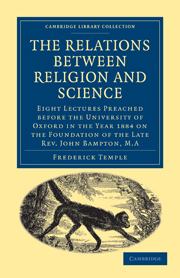 The Relations between Religion and Science
The Relations between Religion and Science Book contents
- Frontmatter
- Contents
- LECTURE I THE ORIGIN AND NATURE OF SCIENTIFIC BELIEF
- LECTURE II THE ORIGIN AND NATURE OF RELIGIOUS BELIEF
- LECTURE III APPARENT CONFLICT BETWEEN SCIENCE AND RELIGION ON FREE-WILL
- LECTURE IV APPARENT CONFLICT BETWEEN RELIGION AND THE DOCTRINE OF EVOLUTION
- LECTURE V REVELATION THE MEANS OF DEVELOPING AND COMPLETING SPIRITUAL KNOWLEDGE
- LECTURE VI APPARENT COLLISION BETWEEN RELIGION AND THE DOCTRINE OF EVOLUTION
- LECTURE VII APPARENT COLLISION OF SCIENCE WITH THE CLAIM TO SUPERNATURAL POWER
- LECTURE VIII THE CONCLUSION OF THE ARGUMENT
LECTURE I - THE ORIGIN AND NATURE OF SCIENTIFIC BELIEF
Published online by Cambridge University Press: 29 August 2010
- Frontmatter
- Contents
- LECTURE I THE ORIGIN AND NATURE OF SCIENTIFIC BELIEF
- LECTURE II THE ORIGIN AND NATURE OF RELIGIOUS BELIEF
- LECTURE III APPARENT CONFLICT BETWEEN SCIENCE AND RELIGION ON FREE-WILL
- LECTURE IV APPARENT CONFLICT BETWEEN RELIGION AND THE DOCTRINE OF EVOLUTION
- LECTURE V REVELATION THE MEANS OF DEVELOPING AND COMPLETING SPIRITUAL KNOWLEDGE
- LECTURE VI APPARENT COLLISION BETWEEN RELIGION AND THE DOCTRINE OF EVOLUTION
- LECTURE VII APPARENT COLLISION OF SCIENCE WITH THE CLAIM TO SUPERNATURAL POWER
- LECTURE VIII THE CONCLUSION OF THE ARGUMENT
Summary
‘O Lord, how manifold are Thy works: in wisdom hast Thou made them all; the earth is full of Thy riches.’
— Psalm civ. 24.THOSE who believe that the creation and government of the world are the work of a Being Whom it is their duty to love with all their hearts, Who loves them with a love beyond all other love, to Whom they look for guidance now and unending happiness hereafter, have a double motive for studying the forms and operations of Nature; because over and above whatever they may gain of the purest and highest pleasure in the study, and whatever men may gain of material comfort in a thousand forms from the results of the study, they cannot but have always present to their minds the thought, that all these things are revelations of His character, and to know them is in a very real measure to know Him. The believer in God, if he have the faculty and the opportunity, cannot find a more proper employment of time and labour and thought than the study of the ways in which God works and the things which God has made. Among religious men we ought to expect to find the most patient, the most truth-seeking, the most courageous of men of science.
We know that it is not always so; and that on the contrary Science and Religion seem very often to bo the most determined foes to each other that can be found.
- Type
- Chapter
- Information
- The Relations between Religion and ScienceEight Lectures Preached before the University of Oxford in the Year 1884 on the Foundation of the Late Rev. John Bampton, M.A., pp. 1 - 34Publisher: Cambridge University PressPrint publication year: 2009First published in: 1884
